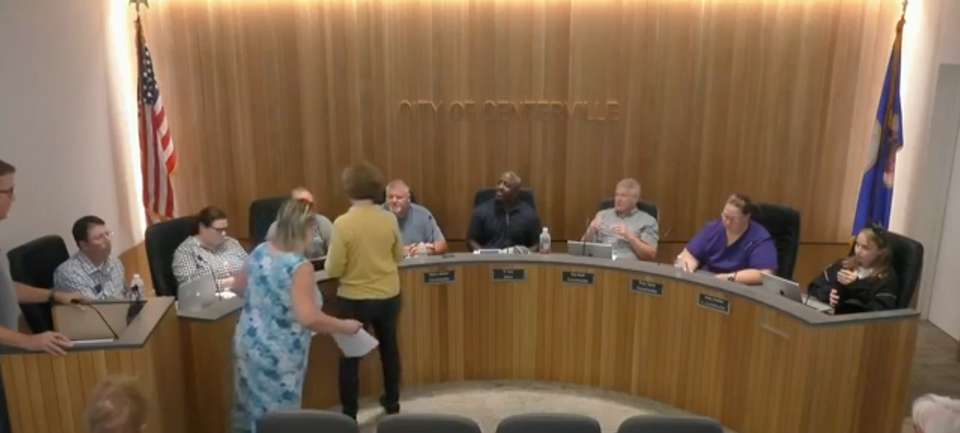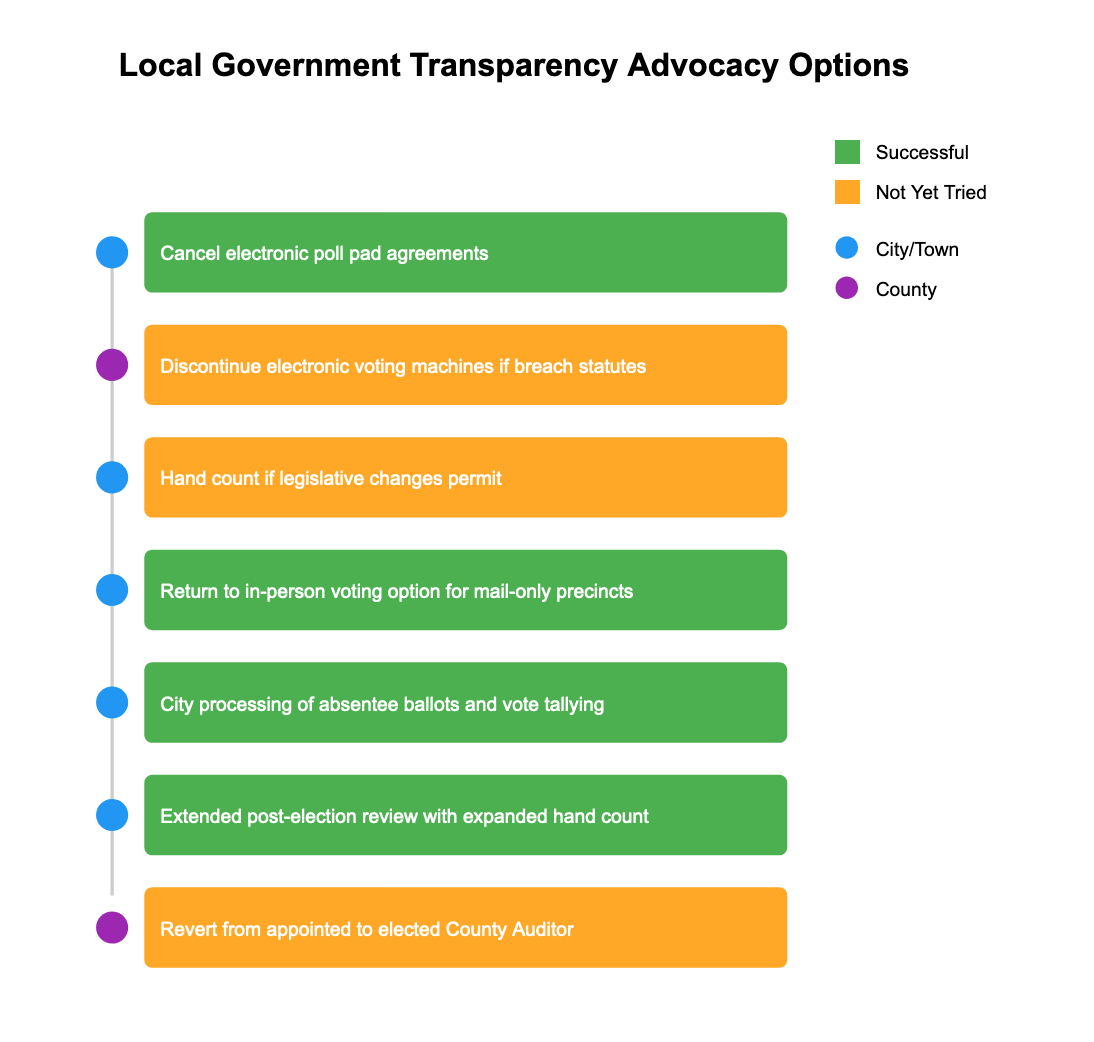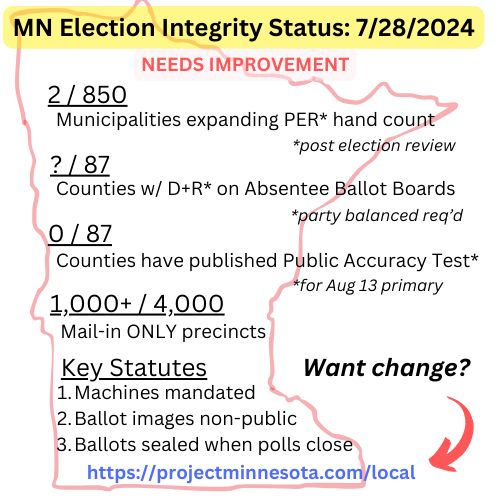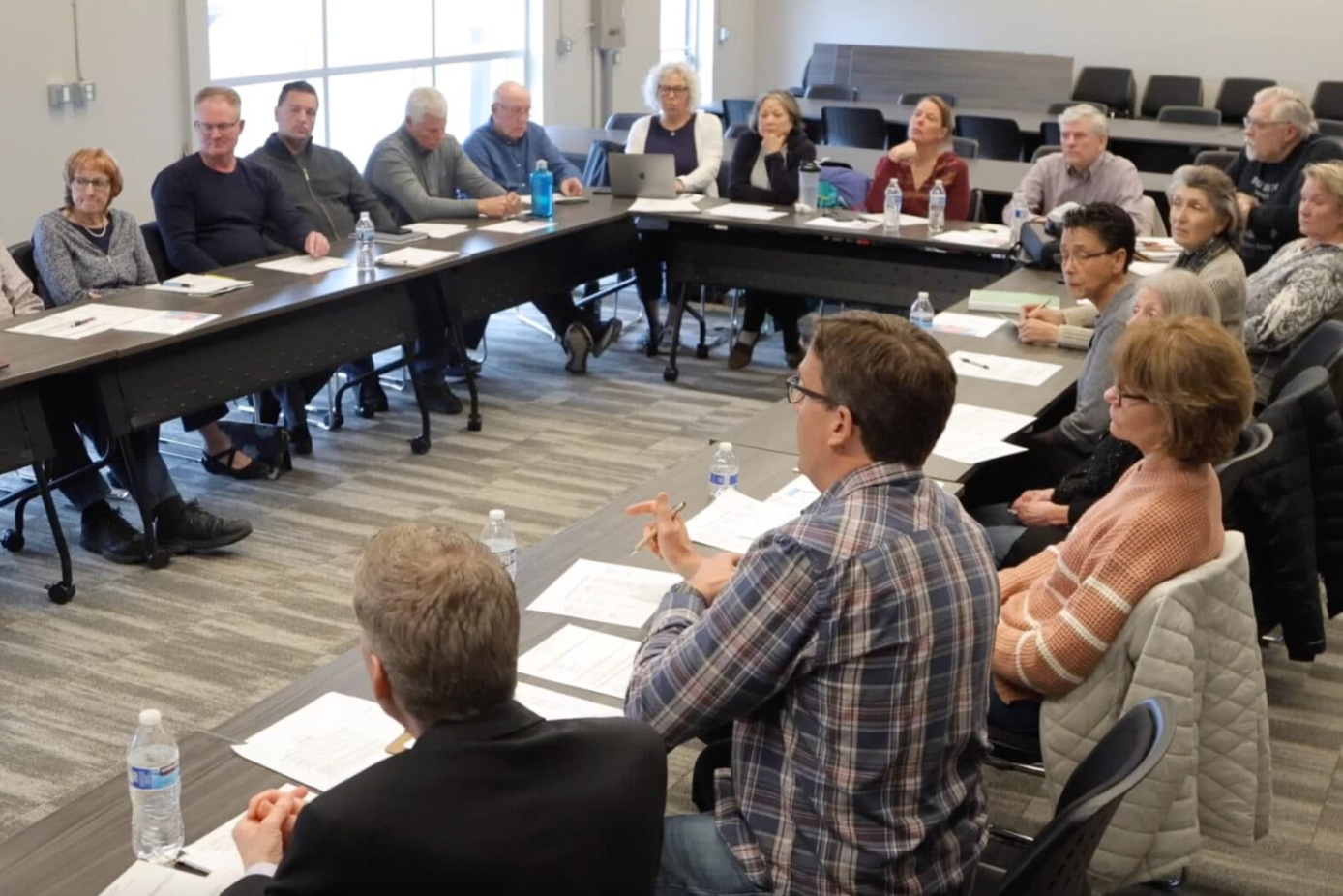Local

If not you, who? If not now, when?
Many ask what they can do right now. If working with city/town or county, this visual may help...

Here are some resolutions to offer to your town boards, city councils, and county commissions.
After gauging the level of interest and education, present one or more of the following. (Note that some of these have already been successful—see sample resolutions after the list.)
- Cancel electronic poll pad agreements (Successful, e.g. City of Oak Grove and City of Ramsey) [City or Town]
- Discontinue electronic voting machines if breach Minnesota election statutes (not yet tried) [City or Town, County]
- Hand count if legislative changes permit (not yet tried) [City or Town]
- Return to in-person voting option for mail-only precincts (succeeded in Collegeville Township) [City or Town]
- City or town to take responsibility (back from county) for processing absentee ballots and tallying votes (succeeded in Crosslake) [City or Town]
- Extending post election review to more of a city's precincts by random selection and also expanding that hand count to competitive races (versions succeeded in 7 cities/towns in Anoka County, 2024) [City or Town with County]
- Revert from appointed to elected County Auditor [County]
1. Cancel electronic poll pad agreements
City of Oak Grove and City of Ramsey (both Anoka County) succeeded.
2. Discontinue electronic voting machines if breach Minnesota election statutes
See this document for proof in Washington County of modem-enabled tabulator.
3. Hand count if legislative changes permit
4. Return to in-person voting option for mail-only precincts
Collegeville succeeded here using this sample resolution.
5. City or town to take responsibility (back from county) for processing absentee ballots and tallying votes
Crosslake succeeded here.
6. Extending post election review to more of a city's precincts by random selection and also expanding that hand count to competitive races
Succeeded in 7 cities/towns in Anoka County in 2024.
Here's how to start the conversation:
7. Revert from appointed to elected county auditor
In Minnesota, many counties have chosen to appoint their auditor, but this can be reverted.
Further reading and study
Did you know? In 2024, the Minnesota Legislature passed a bill that says ballots must be sealed immediately after polls close (possibly to deter hand counts by election judges).
But did you know there is still a way to legally hand count your votes in Minnesota?
It's called the Post Election Review (PER).
Minn Stat 206.89 does not limit the number of precincts that can be included, so your city or town can hand count too.
2 cities have already passed resolutions to do this.
What's the investment? About $1 per voter.
Talk to your city or town today about double checking your precious votes by expanding the PER!

How We Got Here
Thank you for stepping up in favor of election integrity—this is a statewide effort and yet the work is local.
- 2020 raised eyebrows when precinct 4950 during Dakota County PER there were ballots in a purse, Dominion printers arrived same day, and a stack of absentee ballots were unfolded—a 700k variance between reported absentee vote totals and statewide voter registration system (SVRS) 25 days after election found in SOS data set (midwestswampwatch.com)
- 2021 saw the beginning of local, county level and then city-level engagement through Rick Weible's leadership
- 2022 saw Sec of State Steve Simon ignore the Crow Wing County Board's resolution to audit their county's 2020 election
- 2023 saw the coverup of cast vote records (and ballot images) in most counties
- 2023 saw the Legislature mandate electronic tabulators in precincts that previously used them and banned ballot images from public disclosure
- 2024 saw the Legislature make yet more changes, including the sealing of ballots immediately after polls close (to avoid election judge hand counts)
- 2024 also saw the law being broken on August 13, 2024 when uncertified modem-embedded tabulators used on election day in counties/cities/towns (to be determined)
- There have been no serious audits for decades—especially of details like 1) tabulator logs, 2) cast vote records, and 3) ballot images, for any Minnesota primary or state general election [and one post election review in Dakota County for 2020 was missing more than half the ballots]
With transparency narrowing, what can citizens do?
We can become the trusted advisors to our town boards, city councils, and county commissions—it's an obligation to share what we know and the path to elections with integrity through the authority those levels of local government have.
What We Can Do
Your townships, cities, and counties have decision-making authority on several key areas:
- Expanding the postelection review (PERs) to include as many precincts as possible and as many contested races on the ballot as possible
- This resolution has already passed in two cities in Anoka County - Oak Grove and Ramsey
- Here's how to start the conversation:
- Derek in Centerville: https://trms.northmetrotv.com/CablecastPublicSite/show/31665?seekto=151&site=5
- Erik in Plymouth: https://youtu.be/YBjAhk3jXgI?feature=shared&t=118
- If have mail-in only precincts, reversing prior decision and return to in-person voting in precinct - View sample resolution
- This resolution already succeeded in Stearns County - Collegeville
- As a town or city, partnering with the county to take responsibility for receiving, accepting/rejecting, counting, and tallying any absentee, early, and mail-in ballots/votes
- This resolution has already passed in one city in Crow Wing County - Crosslake
- Passing a resolution to ensure that no city employees are used for absentee ballot boards (at the county level), but instead only party-balanced election judges
- Alert erikvanmechelen@protonmail.com if your county is not using party-balanced absentee ballot boards
- Counties can revert back to electing a county auditor (local oversight) if they have previously decided to appoint that position
- Alert erikvanmechelen@protonmail.com if your county currently appoints their auditor - see how Morrison County citizens defended against the threat of an appointed County Auditor
- Redrawing precinct boundaries to allow for the decision to be made once again whether (or not) to use electronic equipment
- As seen in MS 206.58 AUTHORIZATION FOR USE. Subd. 1 Municipalities. ''Once a municipality has adopted the use of an electronic voting system in one or more precincts, the municipality must continue to use an electronic voting system for state elections in those precincts.'' (emphasis added)
- When redrawing precinct boundaries in #6, precinct sizes can be capped at a certain number of voters to assist with logistics, planning, and training of election judges and poll workers
- Opting out of the KNOWiNK (BPro) electronic pollpads (e-pollbooks) given their internet connectivity and integrated feature set (if desired, use paper pollbooks instead to check-in voters)—it appears that e-pollbooks can both monitor and modify election data and results
- Opt out of electronic tabulators IF county staff cannot provide:
- sufficient testing
- cast vote records
- validation of ballot images creation (even though ballot images may currently not be shared with public)
- also consider asking for a modem audit of tabulators
- note that unlike some states, by statute only the Office of the Secretary of State is needed to certify electronic equipment and it is not necessary to test all equipment (therefore many tabulators and other equipment may go untested)
- Conduct a parallel hand count and human hand tally on election day*
*It appears that the 94th Legislature (2024) will introduce a new subdivision in MS 204C.20 BALLOTS; NUMBER TO BE COUNTED. which will hinder this idea, even though hand counting is not illegal. (It would be surprising for the legislature to outlaw hand counting given that it is the default backup plan in case of electronic outages.)
#1-8 above are currently legal, but that can change. If pursuing any of the above and facing resistance, ask oneself: Why should anyone object if the goal is a secure, transparent, verifiable, and accessible election and these approaches are within the currently written election codes?
If the laws change in response to your efforts, then so be it. Never give up.
What's the First Step?
Familiarize yourself with your township board or city council. (If in very small county, consider starting with county commissioners.)
The main goal is to find a true leader.
If you are not already attending meetings, go to the next one. Feel out the lay of the land.
A few questions to observe or even ask directly:
- Who are your city council members?
- What is their level of understanding about election law, process, and electronic systems?
- How are they staying informed about election-related news?
You will be helping the leader you find to navigate their options—cities and towns have more authority to increase integrity than they sometimes know. Your job is to help them learn about their options.
Find Your Groups

It is possible to take the first step alone—Mim did—but sometimes it helps to have one or two others to work alongside you.
Maybe you are already meeting face to face with others interested in this topic and moving the needle locally? As has been going on in Anoka since 2021/2.
Learn more about how to find your group. Or contact us to see if we are already connected with someone in your area.
Next Step: Bringing Resolutions to Cities and Towns
Groups like the Anoka County Election Integrity Team (ACEIT) have done a lot of the legwork when it comes to resolutions that can be brought to town and city boards.
Crucially, they even helped the City of Oak Grove and the City of Ramsey to pass resolutions to expand their post election review (PER) hand counts for additional precincts and down ballot elections.
Learn more about ACEIT's success here in this video report from Liz Collin:
Still have questions on getting started or getting connected? Email us.
Remember, YOU, as the election integrity advocate, are the TRUSTED ADVISOR—it is our obligation to inform our cities, towns, and counties the reality of the situation with our elections and how they can be improved.